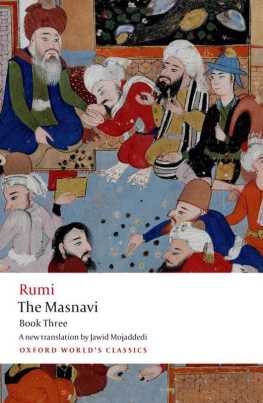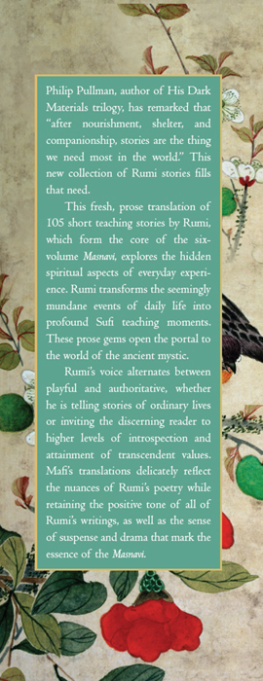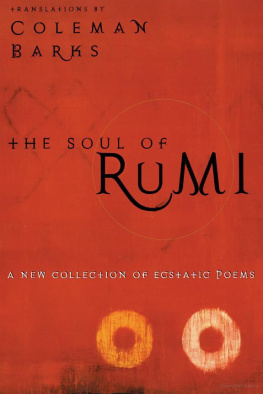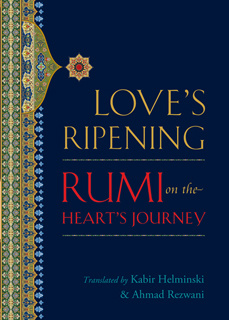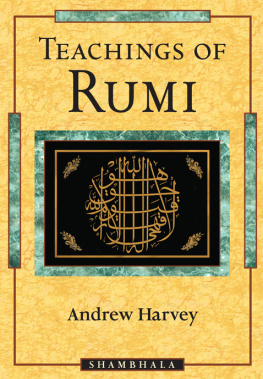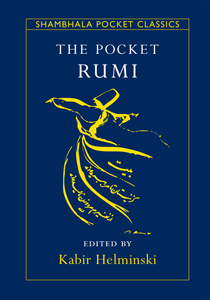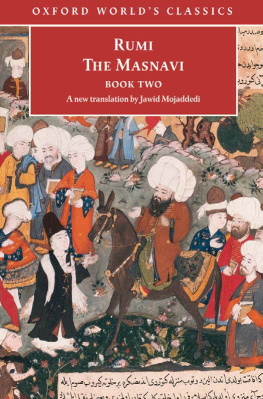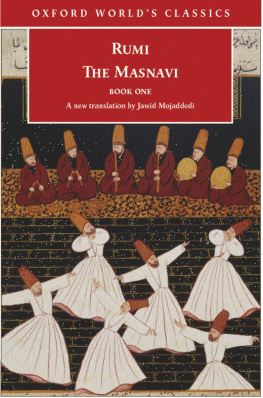Rumi - The Masnavi, Book Three: 3
Here you can read online Rumi - The Masnavi, Book Three: 3 full text of the book (entire story) in english for free. Download pdf and epub, get meaning, cover and reviews about this ebook. publisher: Oxford University Press, USA, genre: Art. Description of the work, (preface) as well as reviews are available. Best literature library LitArk.com created for fans of good reading and offers a wide selection of genres:
Romance novel
Science fiction
Adventure
Detective
Science
History
Home and family
Prose
Art
Politics
Computer
Non-fiction
Religion
Business
Children
Humor
Choose a favorite category and find really read worthwhile books. Enjoy immersion in the world of imagination, feel the emotions of the characters or learn something new for yourself, make an fascinating discovery.
- Book:The Masnavi, Book Three: 3
- Author:
- Publisher:Oxford University Press, USA
- Genre:
- Rating:4 / 5
- Favourites:Add to favourites
- Your mark:
- 80
- 1
- 2
- 3
- 4
- 5
The Masnavi, Book Three: 3: summary, description and annotation
We offer to read an annotation, description, summary or preface (depends on what the author of the book "The Masnavi, Book Three: 3" wrote himself). If you haven't found the necessary information about the book — write in the comments, we will try to find it.
Rumi: author's other books
Who wrote The Masnavi, Book Three: 3? Find out the surname, the name of the author of the book and a list of all author's works by series.
The Masnavi, Book Three: 3 — read online for free the complete book (whole text) full work
Below is the text of the book, divided by pages. System saving the place of the last page read, allows you to conveniently read the book "The Masnavi, Book Three: 3" online for free, without having to search again every time where you left off. Put a bookmark, and you can go to the page where you finished reading at any time.
Font size:
Interval:
Bookmark:

Great Clarendon Street, Oxford ox2 6DP
United Kingdom
Oxford University Press is a department of the University of Oxford. It furthers the Universitys objective of excellence in research, scholarship, and education by publishing worldwide. Oxford is a registered trade mark of Oxford University Press in the UK and in certain other countries
Jawid Mojaddedi 2013
The moral rights of the author have been asserted
First published as an Oxford Worlds Classics paperback 2013
Impression: 1
All rights reserved. No part of this publication may be reproduced, stored in a retrieval system, or transmitted, in any form or by any means, without the prior permission in writing of Oxford University Press, or as expressly permitted by law, by licence or under terms agreed with the appropriate reprographics rights organization. Enquiries concerning reproduction outside the scope of the above should be sent to the Rights Department, Oxford University Press, at the address above
You must not circulate this work in any other form and you must impose this same condition on any acquirer
Published in the United States of America by Oxford University Press 198 Madison Avenue, New York, NY 10016, United States of America
British Library Cataloguing in Publication Data
Data available
Library of Congress Control Number: 2013938935
ISBN 9780199652037
Printed in Great Britain by
Clays Ltd, St Ives plc
Links to third party websites are provided by Oxford in good faith and for information only. Oxford disclaims any responsibility for the materials contained in any third party website referenced in this work.
OXFORD WORLDS CLASSICS
For over 100 years Oxford Worlds Classics have brought readers closer to the worlds great literature. Now with over 700 titlesfrom the 4,000-year-old myths of Mesopotamia to the twentieth centurys greatest novelsthe series makes available lesser-known as well as celebrated writing.
The pocket-sized hardbacks of the early years contained introductions by Virginia Woolf, T. S. Eliot, Graham Greene, and other literary figures which enriched the experience of reading. Today the series is recognized for its fine scholarship and reliability in texts that span world literature, drama and poetry, religion, philosophy, and politics. Each edition includes perceptive commentary and essential background information to meet the changing needs of readers.
Refer to the to navigate through the material in this Oxford Worlds Classics ebook. Use the asterisks (*) throughout the text to access the hyperlinked Explanatory Notes.
OXFORD WORLDS CLASSICS

JALAL AL-DIN RUMI
BOOK THREE

Translated with an Introduction and Notes by
JAWID MOJADDEDI

OXFORD WORLDS CLASSICS
THE MASNAVI
R UMI , known in Iran and Central Asia as Mowlana Jalaloddin Balkhi, was born in 1207 in the province of Balkh, now the border region between Afghanistan and Tajikistan. His family emigrated when he was still a child, shortly before Genghis Khan and his Mongol army arrived in Balkh. They settled permanently in Konya, central Anatolia, which was formerly part of the Eastern Roman Empire (Rum). Rumi was probably introduced to Sufism originally through his father, Baha Valad, a popular preacher who also taught Sufipiety to a group of disciples. However, the turning-point in Rumis life came in 1244, when he met in Konya a mysterious wandering Suficalled Shamsoddin of Tabriz. Shams, as he is most often referred to by Rumi, taught him the profoundest levels of Sufism, transforming him from a pious religious scholar to an ecstatic mystic. Rumi expressed his new vision of reality in volumes of mystical poetry. His enormous collection of lyrical poetry is considered one of the best that has ever been produced, while his poem in rhyming couplets, the Masnavi, is so revered as the most consummate expression of Sufimysticism that it is commonly referred to as the Quran in Persian.
When Rumi died, on 17 December 1273, shortly after having completed his work on the Masnavi, his passing was deeply mourned by the citizens of Konya, including the Christian and Jewish communities. His disciples formed the Mevlevi Sufi order, which was named after Rumi, whom they referred to as Our Lord (Turkish Mevlana, Persian Mowlana). They are better known in Europe and North America as the Whirling Dervishes, because of the distinctive dance that they now perform as one of their central rituals. Rumis death is commemorated annually in Konya, attracting pilgrims from all corners of the globe and every religion. The popularity of his poetry has risen so much in recent decades that the Christian Science Monitor identified Rumi as the most published poet in America in 1997.
J AWID M OJADDEDI , a native of Afghanistan, is currently Associate Professor and Director of Graduate Studies at the Department of Religion, Rutgers University. Dr Mojaddedis translation The Masnavi: Book One (Oxford, 2004) was awarded the Lois Roth Prize by the American Institute of Iranian Studies. His previous books include Beyond Dogma: Rumis Teachings on Friendship with God and Early Sufi Theories (Oxford, 2012) and The Biographical Tradition in Sufism (Richmond, 2001).
For Janajan
I SHOULD like to express my gratitude to my immediate family, my friends, and all the teachers I have studied under. Time spent with Dr Alireza Nurbakhsh and Paul Weber has served as an instructive reminder of the living reality of what Rumi points to in his thirteenth-century poem. Gregory Anguss comments about mystical knowledge at a meeting in Washington DC in 2012 helped shape the introduction to Book Three presented here. Once again, I have been very fortunate to work with an editor as supportive and cooperative as Judith Luna. I am also grateful for the comments and criticisms offered by readers of initial drafts of this translation, especially Dick Davis, and for the encouragement I have received from readers to continue this project. I alone am responsible for any flaws.
THE MASNAVI
BOOK THREE
Book Three of the Masnavi
R UMIS Masnavi is probably the longest mystical poem ever written by a single author from any religious tradition. It consists of about 26,000 verses, divided into six books. The current volume is a translation of the third book of the Masnavi, and follows Book One and Book Two, also published in Oxford Worlds Classics.
Much has been written on Rumi and his Masnavi. However, one point which has not been explored extensively is its organizational framework. Would Rumi have had an overall framework in mind when he compiled this long and complex poem? The richness of the Masnavi makes it very hard to draw any definitive conclusions. On the one hand, that Rumi divided his poem into six books of roughly equal length, each with its own distinct introduction, may suggest an overall framework of some kind. On the other, Rumis many digressions, as well as his emphasis on the divine origin of his poetry, can give the impression that he did not feel constrained by any particular framework, or perhaps did not want the reader to be distracted by it from the immediate focus.
Next pageFont size:
Interval:
Bookmark:
Similar books «The Masnavi, Book Three: 3»
Look at similar books to The Masnavi, Book Three: 3. We have selected literature similar in name and meaning in the hope of providing readers with more options to find new, interesting, not yet read works.
Discussion, reviews of the book The Masnavi, Book Three: 3 and just readers' own opinions. Leave your comments, write what you think about the work, its meaning or the main characters. Specify what exactly you liked and what you didn't like, and why you think so.

